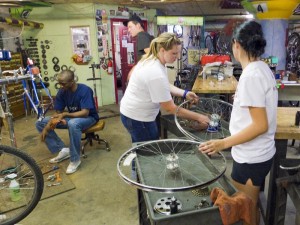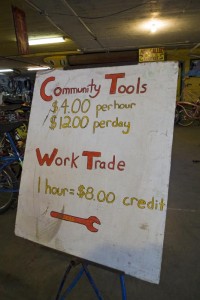 BICAS board members may soon be writing their rent checks to someone new.
BICAS board members may soon be writing their rent checks to someone new.
The Arizona Department of Transportation owns the Citizen’s Transfer warehouse which houses BICAS and dozens of local artists. ADOT is granting an easement to the City of Tucson because of the potential impact of roadway construction in the area. The city would then take control of the warehouse.
The warehouse is currently managed by David Aguirre, who leases the building from ADOT and subleases the space to BICAS and the artists.
Tim Murphy, the city’s real estate program manager, said the City Council requested proposals about potentially changing the management prior to the transfer — which Murphy said will occur on or before July 1, 2010.
The Warehouse Arts Management Organization and BICAS have worked together to create a proposal requesting WAMO become the leaseholder of the building.
BICAS and Aguirre have had a tumultuous relationship over the last few years, which according to BICAS board member Erik Ryberg, have made BICAS officials concerned about their ability to remain in the warehouse.
“David Aguirre has made it pretty clear to BICAS that he doesn’t believe that BICAS belongs in the building,” Ryberg said. “We fear that if this lease hold is given to Mr. Aguirre, BICAS probably won’t be able to stay.”
Aguirre did not return repeated phone calls, but wrote an editorial for the Tucson Citizen earlier this year in which he said, “I want artists and BICAS to remain and grow and I want all of us to be happy together at the Citizens Warehouse.”
Ryberg said they see it differently.
“We got in a very public disagreement about the rent about a year ago when he raised our rent considerably after learning that we had been saving money to possibly purchase a building somewhere down the road,” Ryberg said. “Since then he has taken various steps to make life in the building hard for us. For example, he recently informed us that we would no longer be permitted to use the bathrooms in the building and that if we desired bathrooms we needed to purchase Porta-Potties and put them out in the parking lot.”
According to Ryberg, BICAS was able to show that the leaseholder was responsible for providing bathrooms to the employees of BICAS, but not BICAS’ patrons — who now use a portable restroom located in the parking lot.
“Things like that make us concerned that once he has the power to throw us out, he’ll do so,” Ryberg said.
Aguirre wrote about the bathroom issue in his editorial.
BICAS lets at-risk youth and homeless clients wonder around the inside of the building. Things get stolen, broken, or damaged on occasion. I hate those markers that kids use to mark up the walls and studio doors. I suppose it’s better than using spray paint. But these are things that responsible people should be able to work out, right? Yet, this is an ongoing topic of concern. One solution is get BICAS to install a Port-a-Potty in the fenced yard so that BICAS clients won’t need to enter the main floor to go to the bathroom. They have a LOT (a lot) of clients that impact the property 6 days a week in a number of ways some of which I’ve mentioned. A product of their success. I’m glad for their success. I’d also be glad to have a more secure building with less negative impacts and less attitude.
BICAS shop coordinator Troy Neiman said in addition to the limited restroom use being a concern, the general disrepair of the building is an issue.
“As far as the leaseholder goes, there have never been any written leases,” Neiman said. “I think there was sort of an idea from the state that the leaseholder would do the repairs to the building, but there was never any sort of measurement, as far as I know, about how much income the building is bringing in and how much is going back into the building.”
 Neiman said they performed an informal survey and estimate the rent from all the tenants bring in $35,000 a year after all the utilities are paid.
Neiman said they performed an informal survey and estimate the rent from all the tenants bring in $35,000 a year after all the utilities are paid.
“One thing I have seen over the years is that all these spaces start to get split up smaller and smaller and the rent starts to go up and up, but you don’t really see any improvements in the building other than that these walls are dividing it to essentially make more money off of the space,” Neiman said.
BICAS board members hope the WAMO proposal will give them a sense of security to be able to stay in the space long-term and spend money on improvements to the whole building.
“BICAS has put about $40,000 into that space and we would like to put more money into improving the building except that our position there has always been so precarious,” Ryberg said.
Ryberg said BICAS will provide WAMO with a minimum of $30,000 and up to $48,000 to improve the whole building, including the artists’ spaces.
WAMO’s president Marvin Shaver said the money would be a loan.
“They have offered to loan WAMO and the Citizen’s building that money primarily to do roof repairs on a section that is in dire need of repair,” Shaver said. “It would be in exchange for a long-term lease. They wouldn’t be paying rent until the loan was paid back.”
Shaver said that because WAMO is a nonprofit organization the rent money would be reinvested.
“It would be put back into the building to do renovations, repairs, maintenance — expand if possible, Shaver said. “Probably at some point if we can, we’d start putting some aside for the eventual purchase of the building.”
In e-mails obtained by TucsonVelo.com, Aguirre suggests WAMO should not submit a proposal to become the leaseholder for the Citizen’s Transfer warehouse and lays out several reasons why it would be a bad idea.
I understand that WAMO board members, in collaboration with Bicas employees, is preparing a proposal to manage the Citizens Warehouse,” Aguirre wrote. “WAMO should decide not to turn in a proposal for the Citizens Warehouse, but should do a proposal for the Steinfeld Warehouse.
Wamo board members should focus where help is most needed: the acquisition of the Steinfeld Warehouse. I’m sorry that WAMO was unable to acquire a warehouse on Toole, but for the benefit of all involved, especially the resident artists, please don’t compete with the arts organization already managing and operating the Citizens Art Studios. TAC has a solid plan for the next 5 years, and forever after, keeping the project in an arts nonprofit hands, doing what it does best: providing a permanent space for artists.
Aguirre writes that he formed a nonprofit which has been managing the warehouse for years; and that he has the experience and planning to continue to do so. He also said he has a plan to purchase the building when ADOT sells it after the construction is finished.
Shaver said WAMO has spoken with the artists in the building and hasn’t encountered any people who are against the proposal.
“So far no one has said they don’t want us to do it,” Shaver said. “There have been meetings with artists as well as BICAS in the building and everyone seems to feel positive about it. They just want to maintain the arts use of the building.”
“BICAS is very excited,” Ryberg said. “We haven’t had a lot of confidence in our ability to stay in that building for over a year now. We have worked very hard to talk to the other artists in the building and get an understanding of what they want and what the needs in the building are.”
BICAS has been sending out e-mail and Facebook messages asking people to send a letter to their city council person supporting the WAMO proposal.
Murphy, the city’s real estate program manager, said he wasn’t sure when the council would consider the proposals.

[…] I wrote a piece a while back about BICAS and WAMO teaming up to take over the lease of the Citizen Transfer warehouse that houses BICAS and dozens of artists. […]
Here elaborates the cake-like.com matter not only extensively but also detailly .I support the write’s cake-like.com unique point.It is useful and benefit to your daily life.You can cake-like.com go those sits to know more relate things.They are strongly recommended by friends.Personally